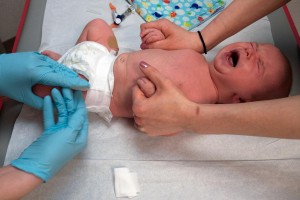
Update: Gov. Jerry Brown signed this bill into law on Sept. 30, 2012.
California has one of the more lenient approaches for parents who wish to opt out of vaccinations for their school-age children. While state law requires that children must be vaccinated against various illnesses (think polio, measles, tetanus) to enroll in school, California parents can opt out of vaccines simply by filing a short statement stating that immunizations are contrary to their beliefs. It's known as a personal belief exemption.
This week in Sacramento, the Senate passed AB 2109, a bill to make this exemption a little tougher. Under the bill, parents who don't wish to have their children vaccinated must meet with a health care provider to talk about risks and benefits of vaccines. The provider can be a doctor, nurse practitioner, physician assistant, osteopathic physician, naturopathic doctor or a credentialed school nurse. The provider must sign a form and the parent must still provide a written statement.
Assemblyman Richard Pan of Sacramento, a pediatrician himself, sponsored the bill. He pointed to misinformation as a driver of parents opting out of vaccines. "Parents become uncertain. They're not sure what they should do," he told me today in an interview. "They’re being told their children should be immunized but at the same time, they’re seeing scary stuff out on the internet."
Pan noted that the bill does not mandate vaccination of all children. "This bill does not take away the parent’s right to make a decision about whether to get their child immunized or not. We just want to make sure it’s an informed decision."